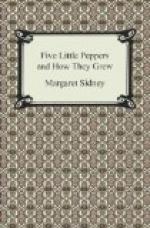“The first thing I can remember,” he had often told Polly, “is Candace taking out huge red and white peppermint drops, from the big glass jar in the window, and telling me to hold out both hands.”
And after the “pinafore days” were over, Candace was the boy’s helper in all his sports where a woman’s needle could stitch him out of any difficulty. She it was who made the sails to his boats, and marvelous skate bags. She embroidered the most intricate of straps for his school-books, and once she horrified him completely by working in red cotton, large “J’s” on two handkerchiefs. He stifled the horror when he saw her delight in presenting the gift, and afterwards was careful to remember to carry a handkerchief occasionally when on an errand to the shop.
Latterly Candace was occupied in preparing pins for Jasper’s cabinet, out of old needles that had lost their eyes. She cleverly put on red and black sealing wax heads, turning them out as round as the skillful manipulation of deft fingers could make them. In this new employment, the boy kept her well occupied, many half-dollars thereby finding their way into her little till.
“I wish Phronsie had come,” said Polly, as she and Jasper sorted the pins in the little wooden tray Candace kept for the purpose. “How many red ones you will have, Jasper—see—fifteen; well, they’re prettier than the others.”
“Ef little Miss had come wid you,” said Candace, emerging from the folds of a chintz curtain that divided the shop from the bedroom, “she’d ‘a’ seen my doll I made for her. Land! but it’s a beauty.”
“Oh, Candace!” exclaimed Polly, dropping the big pin she held, and allowing it to roll off the counter to the floor. “What a pity we didn’t bring her! Do let us see the doll.”
“She’s a perfec’ beauty!” repeated Candace in satisfaction, “an’ I done made her all myself fer de little Miss,” and she dodged behind the curtain again, this time bringing out a large rag doll with surprising black bead eyes, a generous crop of wool on its head, and a red worsted mouth.
“Dat’s my own hair,” said Candace, pointing to the doll’s head with pride, “so I know it’s good; an’ ain’t dat mouf pretty?”
“Oh, Candace!” exclaimed Polly, seizing the doll, and skillfully evading the question, “what a lovely dress—and the apron is a dear”—
“Ain’t it?” said Candace, her black face aglow with delight. “Ole Miss gimme dat yeller satin long ago, w’en I belonged to her befo’ de war. An’ dat yere apun was a piece of ole Miss’s night-cap. She used to have sights of ’em, and dey was all ruffled like to kill, an’ made o’ tambour work.”
Polly had already heard many times the story of Madame Carroll’s night-caps, so she returned to the subject of the doll’s beauty as a desirable change.
“Do you want us to take this to Phronsie?” she asked. “Jasper, won’t she be delighted?”
“Land, no!” cried Candace, recovering the doll in alarm; “I’d never sleep a week o’ nights ef I didn’t put dat yere doll into dat bressed child’s arms.”




